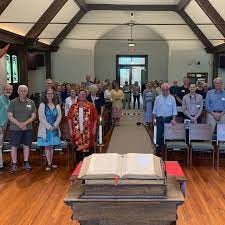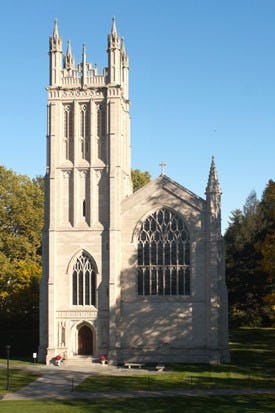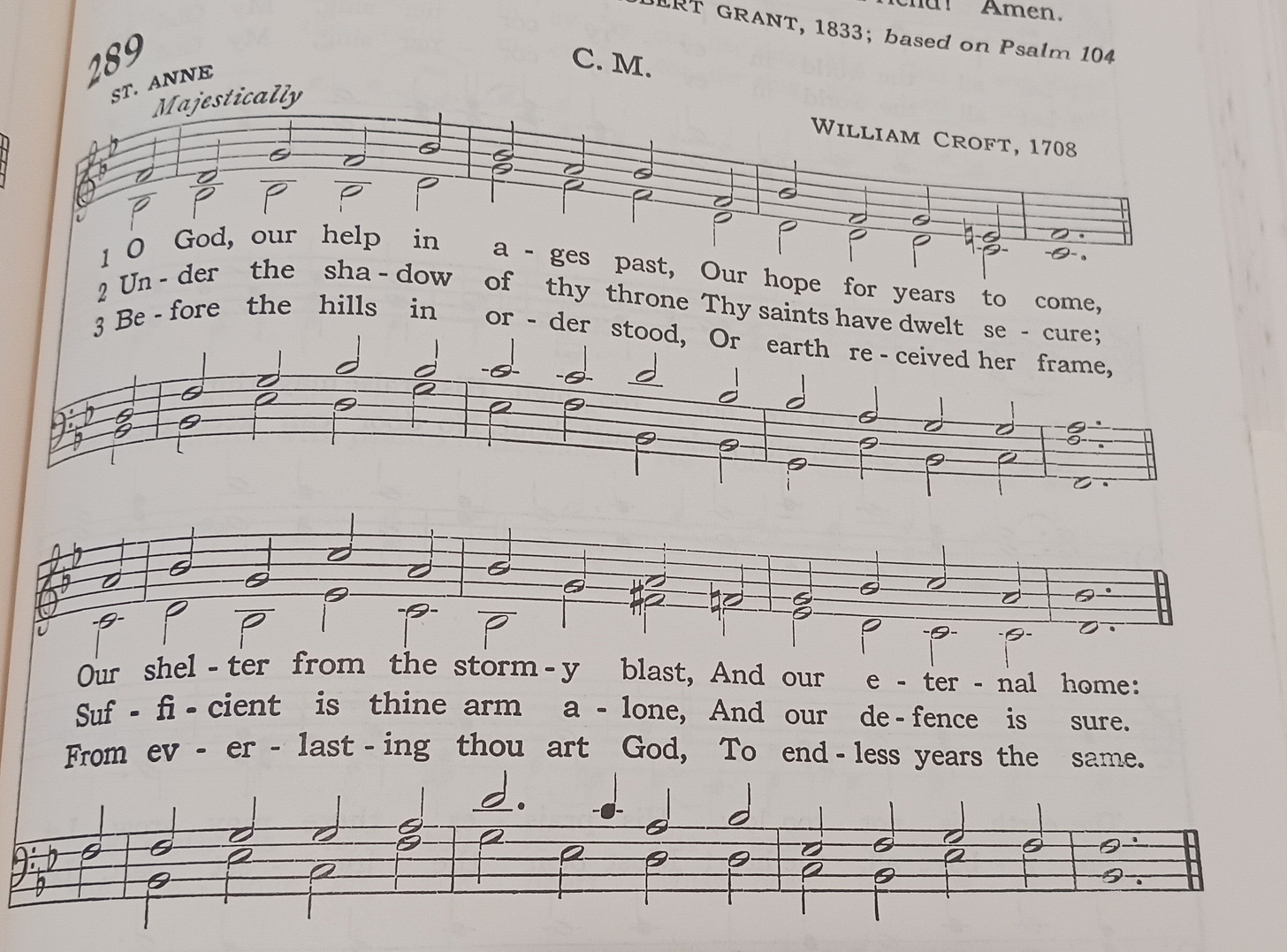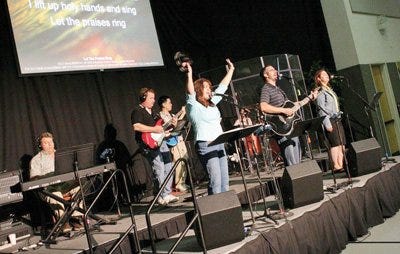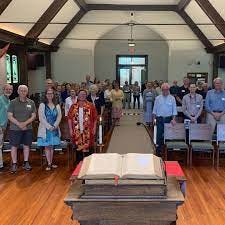The first installment of Journey of a New Christian, a series chronicling the experience of a new believer. Click the “subscribe” button at the end to receive free weekly updates by email. Paid subscribers also have access to an extensive archive of posts about God’s work in our lives.
Soon after our wedding in March 2017, Lousie and I started looking for churches. Louise was well prepared for this exercise; I was not. Having lived in four other states and having been a Christian since age 10, she had attended many churches. Except for an occasional visit to hear music, I’d attended only one—St. John’s Chapel at Groton, the Episcopal boarding school I’d graduated from 50 years earlier.
I didn’t have my heart set on replicating what I’d experienced in the 1960’s. In fact I didn’t have my heart set on anything. I just knew I wanted to go back to church, worship God, and celebrate the work He had done in my life. Wherever the experience led, I was ready to follow.
Louise was open to a range of possibilities, but want us to focus on Bible-believing churches. I wasn’t sure what that meant. How can you call yourself Christian without accepting the divinity of Jesus? And how can you do that without accepting the Bible? I filed these away as questions to be addressed later.
Louise also urged that we avoid legalism—another unfamiliar term. She’d been in churches where personal choices were scrutinized and norms set by the pastor strictly enforced. As a young couple, she and her husband had bought study Bibles recommended by the pastor, only to be told that chapter tabs on the version they’d selected were a crutch and would impede spiritual growth. Another church taught that God prized order in music and syncopation was of the work of the Devil. At a third, her teenaged son was scolded for having a COULD of unsanctioned Christian music in his car. I don’t know what I would have thought if she’d wanted to repeat these experiences. Legalism and I would not have gotten along well together.
Newly married, excited to learn we were on the same page about legalism, we went church shopping.
Since I hadn’t been to a Christian service as an adult, I was surprised by the diversity of churches we visited: small and large, staid and impassioned, traditional and contemporary. There were some differences, too, in the order of worship. In a Presbyterian church, the minister took time to talk with the children of the congregation and inquire what they learned in Sunday school. In a non-denominational church, a visiting clergyman, robed to suggest Biblical attire, reenacted a scene from the life of the Apostle Paul. These were intriguing features, but they didn’t fully offset our overall negative view of the first church as lifeless and formal and the second as focused more on themes of social justice than of Christ’s saving work for humanity.
One thing I missed from my experience at Groton was the music. Over the past few years, I’d been memorizing hymns and singing them to myself on morning walks. “A Mighty Fortress,” “Holy, Holy, Holy,” and “O God Our Help” were three of my favorites. I was dismayed to discover Baptists, Methodists, and Presbyterians don’t sing many of the hymns I remembered from Groton. Those they did sing had rhythms and harmonies very different from what I was used to.
Unfamiliar hymns I could live with. But some of the newer praise music made me uncomfortable. I recoiled from repeated verses, chanted over and over again; in one of the churches we visited, I stopped singing altogether. Louise and I both vetoed that one. It wasn’t just the music. The fervent performance of the praise team had a histrionic quality, and I remember the overall experience as cold and distant.
The fourth church made a strong impression on me, principally because of the sermon on Judges 3. God chose Ehud, a left-handed man, to deliver Israel from Moabite oppression. Wearing his sword under his cloak on his right side, where guards did not think to look for it, he gained access to Moabite king Eglon and slew him. The pastor pointed out that God uses the most unlikely people to further his purposes. That message spoke to me. At age 70, I was an unlikely convert, and the thought that God might still have a use for me was encouraging. Louise, too, was impressed. This was the kind of church she was looking for. The pastor preached from scripture. He treated the text not as a myth or colorful illustration but as a historical record of how God intervened in history, a source of clues about how he would interact with us now.
We both liked the sermon, but we had reservations. First, the size of the church. It was a large congregation with relatively few people our age—not the easiest social group to break into. Second, the volume of the music. It was earsplitting. Finally, distance. The church was over 20 minutes from our house. Not out of the question if we couldn’t find a compelling alternative closer to home, but still something to think about. Louise and I were both working full-time and we had family coming to live with us. A 45-minute round trip, especially if we went to church for meetings during the week, would seriously complicate already crowded schedules.
We did more research. This last church was affiliated with Converge, formerly the Baptist General Convention. There was another Converge church less than 10 minute from our home. The next Sunday morning we checked it out. The sermon was excellent, rooted in scripture, and full of common-sense applications to everyday life. The congregation was smaller but diverse in age. Young families stood shoulder to shoulder with people considerably older than us. At the end of the service, a couple our own age greeted us, asked what we thought of the sermon, and encouraged us to talk with the pastor.
After a return visit the next Sunday confirmed our initial impression, we called the church office and arranged to meet with the pastor at a nearby coffee house. I was ill at ease. I hadn’t had a face-to-face conversation with a pastor since my teens. How would this one react to our personal situation—recently married, divorced from former spouses? In churches Louise had previously attended, divorced people weren’t allowed to serve in spiritually sensitive ministries like Sunday school teaching. I doubt I would have responded well to being treated as a second-class citizen.
Pastor’s physical presence quickly put us at ease. He was friendly and relaxed, not judgmental or excessively inquisitive. It felt like he was meeting new neighbors: trying to be friendly and welcoming, getting to know us without asking pointed questions. It was probably obvious that we were recently married. Since we each had two adult children, he must have guessed we’d been married before. He took all that in stride. Louise asked about the church’s tenets of faith. They aligned closely with hers and made sense to me even though I couldn’t yet say I fully embraced them.
Finally, as the conversation wound down, he asked what our plans were. Louise said we were still visiting churches, but I jumped in and said we were going to attend this one. Louise was taken aback. We had agreed we would make the decision together.
Despite my impetuousness, our choice of this church has borne fruit in both of our lives.
I began reading the Bible, embraced the tenets of faith Pastor laid out at the coffee house, and was baptized. Louise and I joined the church and began to serve in its ministries. No one has taken us to task for being divorce. On the contrary, most people we now there have personal lives as complicated and messy as ours. No one has tried to instruct us on which Bible to buy or what music to listen to.
Louise is a deacon now. Unbelievably, though I became a Christian so late in life, I am an elder. Our friends in the church have been good to us, reaching out to our family members and helping us weather the storms of life.
Over the 8 years we’ve attended the little church that is so close to our house, God has done great works in our lives. Our marriage and all four of our children have flourished. In his low-key way, Pastor had a great influence on my life. In my next post, I’ll explain how this happened.

